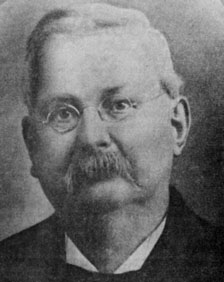Three Forks of the Kentucky River Historical Association
Biography
Dr. Stephen Garrett Sanders
Reprinted by the Author Joyce York Wilson From the "Romantic History of Owsley County"
It has been said of the good doctor that nights never got too dark or too rough for him to travel &
if anyone needed him, he always answered the call to serve.
 DR. STEPHEN G. SANDERS
and his wife, the former Jane Simpson, arrived in Booneville in April 1866, where he at once began the practice of
medicine. No one knows if the young practitioner had a reason for choosing this particular little town in the Kentucky
mountains but the two left their home and an established practice in Alabama to travel by train and jolt wagon,
bringing their personal belongings with them in a large brass-trimmed trunk.
DR. STEPHEN G. SANDERS
and his wife, the former Jane Simpson, arrived in Booneville in April 1866, where he at once began the practice of
medicine. No one knows if the young practitioner had a reason for choosing this particular little town in the Kentucky
mountains but the two left their home and an established practice in Alabama to travel by train and jolt wagon,
bringing their personal belongings with them in a large brass-trimmed trunk.
It was the year following the Civil War and Dr. Sanders' liberal attitude toward the Negro race more than likely was
responsible in some part for his decision to leave the deep South. A firm believer in nondiscrimination, he practiced
equal rights and insisted if a black man worked for him he should also sit at the same table where he took his meals.
Such ideas doubtless made him unpopular.
Upon arriving in the county seat, the couple took up residence in a local hotel later known as the (Sherman) Cooper Hotel. Since he had come to stay, the 35-year-old physician purchased a lot near the heart of town and engaged carpenters to erect a handsome two-story dwelling with a double veranda that faced on Mulberry Street. A smaller frame building was erected in a corner of the front yard to serve as the doctor's office. (The buildings were demolished by Henry Campbell to make way for the present Fred Callahan residence.)
Booneville had not long been established and portions of the town boundary within the banks of the South Fork River were still unsettled. The entire east end of town served as pasture for the doctor's horses, including his favorite mount. Dr. Sanders had been born May 30, 1831, in Jackson County, Georgia, the son of a well-to-do farmer and slave owner, John Sanders. Stephen remained on his father's plantation until 1851 when he commenced the study of medicine with Doctors James and Samuel Hamilton. At age twenty five the young physician graduated from Atlanta Medical College and practiced in Georgia two years before moving to Alabama. Although several doctors are listed in the 1850 census of Owsley County, it is believed they were self-taught and that Dr. Sanders was the first medical school graduate to serve the area.
He enjoyed a large practice and rode horseback throughout the countryside visiting and caring for the sick and ailing. Weather was never too bad for him to respond to a plea for help and often during winter months it was necessary to cut ice from his stirrups before he could dismount.
A former patient, Sam Estepp, recalls being treated by the capable physician for ninety three long days during the late 1890's when, as a child, he contracted typhoid fever. Dr. Sanders told the boy that he and another patient being treated by a colleague had the two most severe cases of the disease they had ever encountered.
The patient's most vivid recollection of the illness was his not eating a bit of food and having to
take so many different kinds of medicine, none of which seemed to help. A few drops of turpentine on sugar proved to
have the worst taste and the
common remedy to reduce fever, 'asatanlie' powder, was given daily. Mr. Estepp firmly believes that anyone of that
generation who survived typhoid was destined for a long life.
Dr. Sanders' favorite expression and nearest to curse word was "Devil". When three practitioners combined their efforts to operate on a patient who had fallen over a cliff and fractured his skull, they also discussed the probability of saving the man's life.
"Devil!" the noted physician exclaimed, "You'll find out in thirty days." Exactly
twenty-eight days later the man died.
| advanced |
Serving Breathitt, Clay, Jackson, Knox, Lee, Leslie, Owsley, Perry, & Wolfe Counties
Site Created by Sherry Lynn Baker
Copyright ©2005-2022